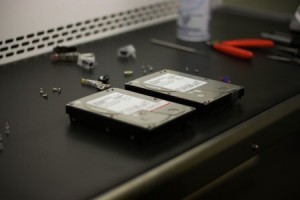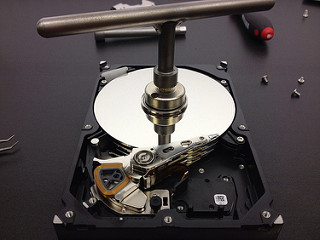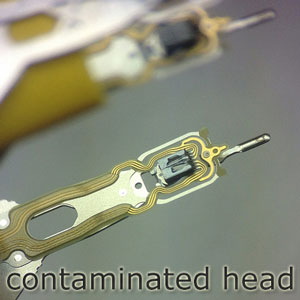Old Hard Drives Offer Little to No Security
There are many things that we take for granted as a technologically advanced society. We assume that we will have internet access nearly everywhere we go, and are surprised when that is not the case. We take for granted that computers will run the way they are supposed to, and that anti-virus software will do its job. Most people don’t even think about these things, but just assume that these constants will always remain so.
Another thing that we take for granted, is that our hard drives will never quit. We don’t think about what would happen if our hard drives simply stopped working, or if a computer was beyond repair. We take for granted that it works, and assume it will always continue to do so. But this is a fallacy that must be carefully considered.
One Man’s Story

A fifty something automotive shop owner came into the store looking for help. All of his data was on the hard drive of a fifteen year old computer that had quit working. All of his customer’s contact information and vehicle repairs were seemingly lost. He had no idea what to do. This man was obviously not ‘computer inclined’, and had not cleaned his computer in a long time, if ever. As we tried to repair the hard drive, we first had to remove quite a layer of dust. Once the dust was removed from the old 520 MB Quantum hard drive we were able to pull the heads out, cleanse them properly, and rehabilitate the drive. We were then able to duplicate the content using our disk imaging equipment. The man was very lucky to still have all of his data.
A Lesson Learned
There is a lesson to be learned from this story. First, you should not wait until your computer is on its last legs to get a new one, or you will run into some very serious problems. Second, hard drives do not last forever. Generally, older hard drives were built to last six to eight years, and the fact that this man got fifteen years out of his hard drive is remarkable. Today, hard drives are only built to last three to four years. It will wear out eventually, so be prepared for that eventuality. Finally, this man was lucky. In many cases a hard drive will be beyond repair, and data will be irretrievable. What would you do if you lost all of your data?
The Importance of Data Backup
It is clear to see the importance of backing up your hard drive routinely, especially if you have an older computer. Backup data storage is necessary for peace of mind and in the event that something does happen to your computer. You could get a virus that causes your entire hard drive to be wiped clean, your hard drive could give out completely, or you could have another computer glitch that causes you to lose data.
When you back up your data routinely, you don’t have to worry about what would happen if something happened to your computer. Backup data storage is of the utmost importance with businesses in particular, as it ensures the integrity of your customer information. You should not wait until something happens to begin backing up your data. You can and should back up at least once monthly.
There are many options for backing up your data. You can purchase a zip drive that saves all of the information on your hard drive onto a zipped disk, which can be accessed in the case of a computer emergency. You can also get flash drives of up to 64 GB to store all of your data.


